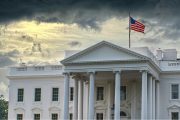
Upon learning that the Supreme Court wouldn’t consider the lawsuit brought by Texas Attorney General Ken Paxton to challenge the election fraud perpetrated in four key battleground states, President Trump tweeted: “The Supreme Court had ZERO interest in the merits of the greatest voter fraud ever perpetrated on the United States of America.” He called it a “disgraceful miscarriage of justice.”
Paxton agreed. The justices didn’t even bother to hear any of the arguments he claimed to justify suing those four states. He angrily asked rhetorically:
If my people are harmed, which I view them as having been harmed, by the fact that other states didn’t follow their election laws and didn’t follow the Constitution, how do I address the fact that my voters are affected by a national election, that potentially was not done correctly, where there was fraud, and in that state law and federal law were not followed?
The high court issued a nonsensical explanation:
Texas has not demonstrated a judicially cognizable interest in the manner in which another State conducts its elections. All other pending motions are dismissed as moot.
It was a classic waffle, as the concept of “standing” — “cognizable interest” — has been carefully defined in Whitmore v. Arkansas, decided by the Supreme Court in 1990:
To establish an Article III case or controversy, a litigant first must clearly demonstrate that he has suffered an “injury in fact.” That injury, we have emphasized repeatedly, must be concrete in both a qualitative and temporal sense.
The complainant must allege an injury to himself that is “distinct and palpable,” … as opposed to merely “abstract,” … and the alleged harm must be actual or imminent, not “conjectural” or “hypothetical.”…
Further, the litigant must satisfy the “causation” and “redressability” prongs of the Article III minima by showing that the injury “fairly can be traced to the challenged action” and “is likely to be redressed by a favorable decision.”
As attorney Andrea Widburg noted in American Thinker, “Texas met those requirements, showing an ‘injury in fact’ that is ‘distinct and palpable,’ that ‘can be traced to the challenged action’ and that can be ‘redressed by a favorable decision.’
So, with the high court’s flimsy excuse exposed, what is its real motivation behind its decision? Dick Morris thinks they were intimidated by the Biden campaign:
The Supreme Court is after justice, of course, but primarily they are after making sure the Supreme Court survives — that’s their institution and that’s their duty.
I believe the Supreme Court was sent a message by Joe Biden and Kamala Harris and the Democratic Party during the election.
And the message was: “If you overturn this election, we will pack you, and make your Court basically meaningless.”
Retired Harvard Law Professor Alan Dershowitz said that, in his opinion, the court just didn’t want to deal with an issue fraught with political overtones:
This Supreme Court decision sends a message. The majority included the three justices appointed by President [Donald] Trump, and they all said, “We’re not going to hear the Texas case. We’re not going to get involved in this election.”
I think this sends a message. It’s not a legal message, but it’s a practical message: the Supreme Court is out of this game.
What happens next? Trump attorney Sidney Powell thinks the situation merits exercising an Executive Order the president issued in 2018: No. 13848, titled “Imposing Certain Sanctions in the Event of Foreign Interference in a United States Election.”
Per that order, the Director of National Intelligence (DNI) “shall conduct an assessment of any information indicating that a foreign government has acted with the intent or purpose of interfering in that election.” The director must present his findings to the president no later than 45 days after the election. That would be Friday, December 18.
Said Powell:
[EO 13848 gives the president] “all kinds of power … to do everything from seize assets to freeze things, demand the impoundment of the machines.
Under the emergency powers, he could even appoint a special prosecutor to look into this, which is exactly what needs to happen.
Every machine, every voting machine in the country should be impounded right now. There’s frankly more than enough criminal probable cause to justify that, for anybody who’s willing to address the law and the facts purely on the basis of truth and not politics, or corporate greed, or global wealth.
And then there’s Section 252 of the Insurrection Act of 1807, which states:
Whenever the President considers that unlawful obstructions, combinations, or assemblages, or rebellion against the authority of the United States, make it impracticable to enforce the laws of the United States in any State by the ordinary course of judicial proceedings, he may call into Federal service such of the militia of any State, and use such of the armed forces, as he considers necessary to enforce those laws or to suppress the rebellion.
As Stephen Meister pointed out in the Epoch Times:
The president’s invocation of the Insurrection Act isn’t a declaration of martial law. The Constitution isn’t suspended. The writ of habeas corpus isn’t suspended. The president would be using troops to enforce the law, not override it.
How that would play out remains to be seen. Suffice to say, the president has numerous options available to him to keep Biden from fraudulently assuming the office of the presidency of the United States on January 20.




